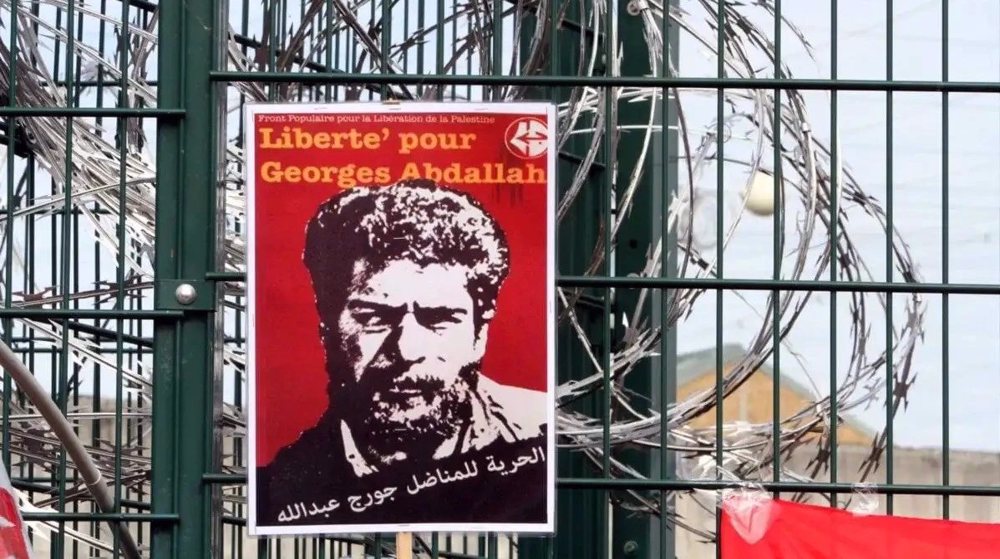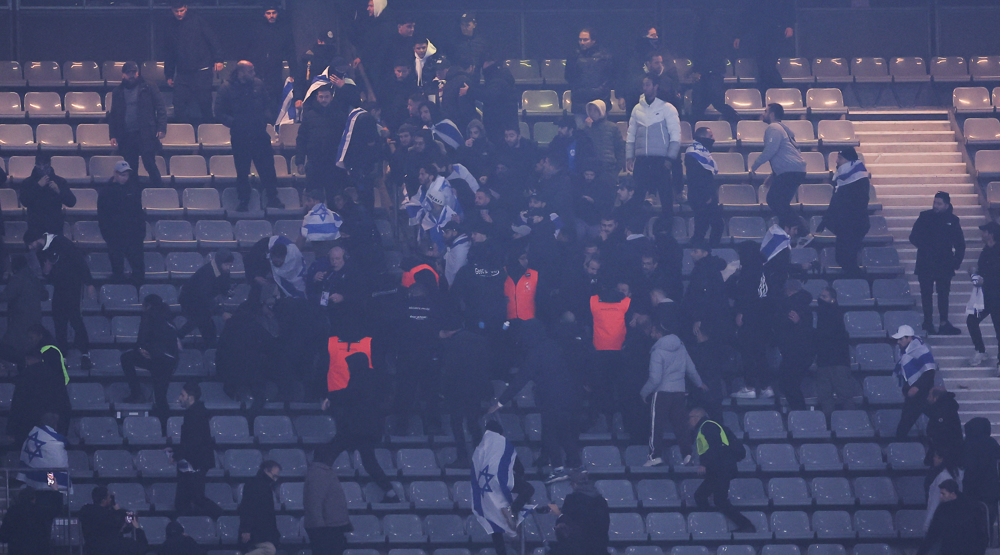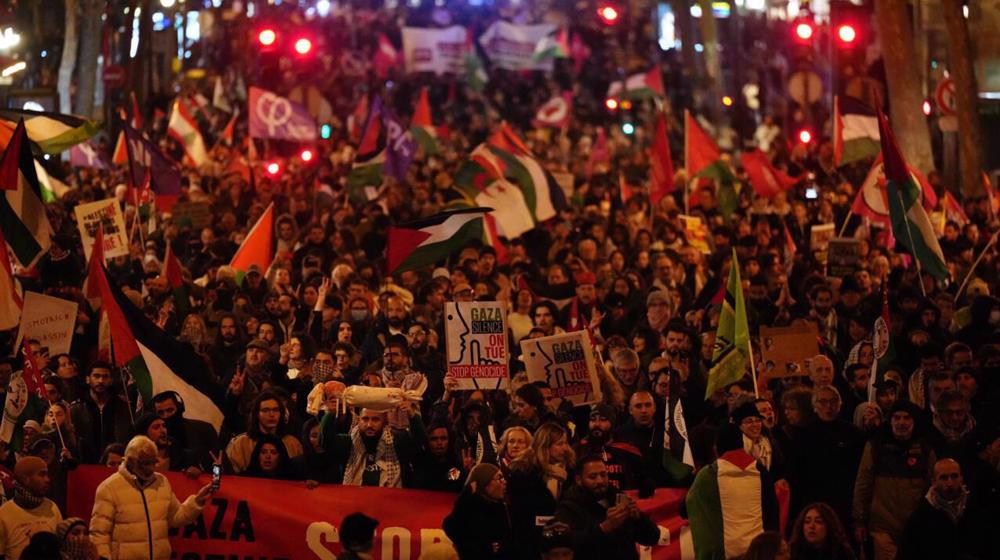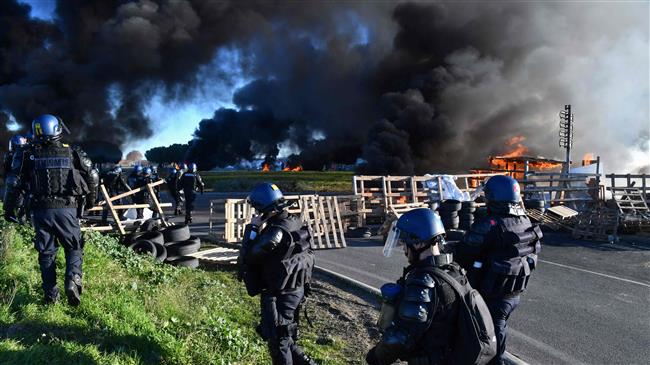France on high alert as 'yellow vest' protests reach elsewhere
France has deployed thousands of security forces to the capital Paris ahead of new round of massive “yellow vest” protests.
The protest organizers said thousands of people are set to take to the streets in Paris on Saturday, and that the protests will continue until all their demands are met.
The rallies were organized even after President Emmanuel Macron scrapped a planned fuel tax and offered a series of wage and tax concessions in a bid to end protests across the country.
“Our organizations support the demands of tax and social justice brought by the movement of yellow vests,” said the organizers in a statement published by French daily Le Parisien.
“They call for demonstrations Saturday, December 15, for social justice and tax, for a real democracy, for equal rights, for a true ecological transition,” it added.
Similar protests are also expected in other cities across the country.

Paris Police Chief Michel Delpuech said they have sent tens of thousands of security forces across the country and some 8,000 only in Paris. The forces are backed up by 14 armored vehicles, water cannon and horses.
“We need to be prepared for worst-case scenarios,” he said.
Delpuech said security forces are aiming to be in “better control” of the situation than they were last weekend, when some 2000 protesters were detained — around half of them in Paris— and hundreds were injured. Six people were also killed.
Protests first erupted last month in rural France among citizens who said they could not afford higher fuel taxes. The demonstrations then transformed into a broader rebuke of Macron’s policies, and they took on a name of their own: the “yellow vest” movement, a reference to the vests worn by people active in the transportation industry, who have been at the forefront of the protests.
In a bid to end protests, the president cancelled the plan to increase fuel tax and offered a rise in the minimum wage, tax relief for pensioners and tax-free overtime for workers in 2019.
The concessions offered last week, however, were rejected by opposition groups and some protesters who described Macron remarks “nonsense,” “a charade,” “a bluff” and “a drop in the ocean.”
His critics, who call him the “President of the Rich,” are still demanding his resignation.
Macron took office last year with a pledge to revitalize the economy; but many voters ranging from conservative pensioners to low-income workers complain that his pro-business policies have mostly benefited companies and the rich.
‘Yellow Vest’ protests spreading across Europe
French “Yellow Vest” protests have now reached Belgium, the Netherlands and the UK.
In the Belgium capital Brussels, police fired tear gas and water cannon to disperse the protesters who took to the streets wearing yellow vest jackets on Friday.
"There have been around 70 arrests following checks carried out as a preventive measure," said Brussels police spokeswoman Ilse Van De Keere.
Police also sealed off an area housing European institutions including the offices of the European Commission and the European Parliament for precautionary measure.
Some local media reported that young protesters blocked a highway linking Brussels to the town of Rekkem in Flanders, located near the French border.
Also, in the Dutch city of Rotterdam, protesters rallied in yellow vests, while singing a song about the Netherlands and handing flowers to passers-by.
The reasons for the protests in Belgium and the Netherlands are not clear, since neither of them have proposed a hike in fuel tax.
But a protester in Rotterdam was complaining that “Our children are hard-working people but they have to pay taxes everywhere.”
She said that “the government is not there for the people. It is there to protect its own interests.”
Protesters also gathered outside the Dutch parliament in The Hague. At least two protesters were detained by police in central Amsterdam.
The French-style protests also broke out in London, bringing the city to a complete standstill on Friday. Demonstrations, again in yellow jackets, blocked Westminster Bridge and later walked down Whitehall.
They gathered outside Downing Street, where a protester with a megaphone was demanding a meeting with Prime Minister Theresa May.
VIDEO | Iran's president urges Pope to help end Israel's onslaught in Gaza
Iran's senior legal official: ICC arrest warrants for Netanyahu ‘great victory'
Nov. 21: ‘Axis of Resistance’ operations against Israeli occupation
VIDEO | Israeli forces storm West Bank’s Jenin again, target civilians
Iran activates advanced centrifuges after IAEA's 'unjust' resolution
VIDEO | Press TV's news headlines
Iran FM: Response to Israeli aggression 'inevitable'
VIDEO | Iran eases the rules for exporting hand-woven carpets














 This makes it easy to access the Press TV website
This makes it easy to access the Press TV website